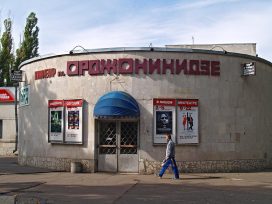Abstracts Osteuropa 5/2007
Birgit Menzel, Ulrich Schmid
The East within the West. Importing popular culture
Numerous products of Western culture are imported from eastern Europe. This is often overlooked because the Critical Theory of the “McDonaldization” of European culture continues to define the debate. On the other hand, impartial individual studies are, as a rule, limited in their analysis of popular culture to a certain national context. If, however, one follows the import routes of prominent phenomena to Western popular culture, it is clear that eastern European traditions and influences are present in various ways. They can be hidden by careful camouflage, made to adapt to public taste through cultural transformation, or appear as something strikingly exotic.
Dorothea Redepenning
Broadway cum Rachmaninov. Eastern European composers in Hollywood
Hollywood film music is a melting pot of popular hits and jazz, of European symphony, of opera, ballet, and Broadway. It was above all emigrants from Europe who created this music which belongs to American cultural identity. The melodic models and orchestral effects for producing melodramatic scenes with emotionally stirring sound are to be found in the works of Rachmaninov and Tchaikovsky. There is a subtle irony in the fact that America’s most beautiful “native songs”, the most popular Western songs, were penned at the height of the Cold War by Dimitri Tiomkin, who had learned his trade in St. Petersburg.
Horst-Jürgen Gerigk
Two Russians in America. Irving Berlin and Dimitri Tiomkin
Irving Berlin and Dimitri Tiomkin provided American light music with lasting achievements. Berlin’s White Christmas and Tiomkin’s title song for the film High Noon are classics. Both composers hail from Russia and, in their careers, are classic examples of the cultural dialogue between America and Europe. However, this should not lead to the impression that these two distinct cultures communicated with one another through light music. A coherent European-American cultural landscape has existed since the eighteenth century. Only within it could Berlin and Tiomkin make an impact.
Katharina Kucher
From arefugee camp into the world’s concert halls. The history of the Don Cossack Choir
Don Cossack Choirs belong to the German concept of Russian folklore just like the balalaika, samovar, and matryoshka. Numerous Black Sea, Volga, Ural, and Don Cossack ensembles serve the West’s longing for the expanses of the taiga and the depths of the Russian soul. Few fans of these burly, yet melancholy Cossack singers know that they are admirers of epigones. The “real” Don Cossack Choir was formed in the 1920s by members of the White Army in a Turkish refugee camp. The story of their rise to world stardom is at the same time the story of an odyssey of homeless men.
Helena Srubar
Magic from the East. Pan Tau conquers West German screens
The congenial children’s hero Pan Tau was the most important export product of socialist Czechoslovakia. In the early 1970s, the series revolutionized West German children’s television. With its mixture of everyday life and fantasy, it offered entertainment suitable for children and cinematic quality. Above all, however, it was considered critical of consumerism, anarchic, and subversive – at the time attributes held in the highest of esteem. Simultaneously, it fulfilled, in Prague fashion, the canon of humanistic moral conception and complied with socialist state ideology.
Ilja Karenovics
Falling Eastern blocs. Tetris or How the Soviet Union made Game Boy a superstar
Probably no other computer game can compete with Tetris when it comes to success and fame. Considerably less well-known is the fact that this puzzle game was invented by a Russian mathematician the same year Mikhail Gorbachev became general secretary of the Communist Party of the Soviet Union. In several ways, the history of this game can be considered symbolic for the perestroika era: With Tetris, Russian pop culture made a new start – but so did the global commercial success of Nintendo’s handheld console Game Boy. Behind the scenes of this story, an international business mystery unfolds in which actors and institutions from the collapsing Soviet Union play a leading role.
Ulrich Schmid
Intercultural incompetence. Borat parodies Western clichés about eastern Europe
The Kazakh reporter Borat Sagdiyev is a fictional character created by the British comedian Sacha Baron Cohen. Borat is ostensibly out to make a documentary film in the West, but he emerges in fact as an agent provocateur: Using politically incorrect statements, he entices his interlocutors into reacting in a way that has an impact on the audience. Last year, the film Borat arrived in American and European cinemas. Acting within the loose-knit framework of a road movie, Cohen lets Borat perform in different episodes which attack precarious phenomena within US society: obsequiousness, bigotry, sport fanaticism, and the cult of stardom.
Ellen Rutten
Dancing around the red star. Russian disco between nostalgia for the East and socialist art
Vladimir Kaminer’s Russian Disco in Berlin has achieved cult status. It is an evening of dance for exile Russians and those nostalgic for the East. It deconstructs national stereotypes and plays with Western clichés of Russia. In doing so, the Russian Disco follows the practice of eastern European artists such as Vitalii Komar & Melamid or Oleg Kulik.
Mirja Lecke
Export hit! The Russian girl band t.A.T.u.
T.A.T.u. is the most successful Russian pop band of all time. This success is no coincidence; it is based on the skilful adaptation of the band’s lesbian image to different cultural environments. T.A.T.u. was conceived as a way to provoke Russian society; by kissing in public, the duo succeeded in being banned twice in western Europe and the United States, which drew considerable publicity. The pop duo’s history shows how structures of the Western consumer industry are applied to Russian conditions, undergo change there, and then influence the West’s perception of Russia.
Holger Gemba
Ruslana. Intercultural marketing from the Carpathians
In 2004, the Ukrainian singer Ruslana won the Eurovision Song Contest. Contrary to what the title of her song Wild Dances suggests, Ruslana is not wild but an educated, successful woman from western Ukraine. She was successful because she mirrored the stereotypes of her homeland and its people so that audiences saw their prejudices confirmed. Since 2006, Ruslana has changed her image. The ethno-regional clichés of Wild Dances have been replaced by the trans-national project Wild Energy. This marketing concept aims for a broader market.
Adrian Wanner
A Russian in New York. Gary Shteyngart and the immigrant chic
In his novels The Russian Debutante’s Handbook and Absurdistan, Gary Shteyngart – Russian Jew, Soviet émigré, and New Yorker by choice – depicts his comet-like rise to “the new Nabokov” with considerable self-irony. With his eastern European immigrant novel, which at the same time is a novel about exiled Americans, Shteyngart is setting a new literary trend. Shteyngart, somewhat like Vladimir Kaminer in Germany, uses his Russian identity for self-promotion. In a grotesque mix of Russian, Jewish, and (Afro-)American pop culture, he attacks American nostalgia for the East and Russian clichés and satirizes the idea of an authentic national culture as well as that of the multicultural synthesis. Yet the border between parody and sentimentality, between kitsch and authentic national pride, is fluid.
Maria Rubins
In foreign tongues. Milan Kundera and Andreï Makine’s French prose
The trans-European identity of bilingual authors such as Milan Kundera and Andreï Makine forces us to reconsider the conventional categories of “East” and “West”, or “foreign” and “native”. Both authors have exchanged their homeland for exile; both write novels and essays in French. Their belonging to the European tradition combines with a distanced, “eastern” view of French culture, society, and media. Kundera resists being classified as a Czech patriot and author. Instead, by means of inter-textual references, he stresses the trans-national element of his work. Makine presents himself as a writer and prophet in the tradition of Tolstoy and Dostoevsky and exposes cultural and historical myths.
Andrea Meyer-Fraatz
Balkan beat, Eskimos, and a Polish cream gateau. Eastern elements in Emir Kusturica’s film Arizona Dream
At first glance, Emir Kusturica’s film Arizona Dream creates a grotesque picture of conditions in America. At second glance, it is clear that the strange elements refer to Eastern culture. Behind the conspicuous natural symbolism lurk myths of Eskimos and Siberian peoples, which provide depth to a barely coherent plot. The soundtrack by Goran Bregovic borrows from Balkan Roma music. All of this can be understood, on one hand, as an attempt to undo the East-West antagonism and, on the other, points to the director’s growing nationalism.
Tom Jürgens
Give us this day our daily Siberia. Imaginary geography as German pop culture
Siberia is an enduring element of German pop culture: The novels of Edwin Erich Dwinger, Ferdinand Ossendowski, and Heinz G. Konsalik influenced the twentieth century as much as the first German television series “So weit die Füße tragen” (As Far as My Feet Will Carry Me) or Gerd Ruge’s reportage. The images depicted here frequently utilize stereotypes established in the Siberian travelogues of the late seventeenth century and in the publications of German scientists in the eighteenth century. In doing so, the stereotype is not only a “flat picture”, but fulfils a communicative function between mediation and overcoming trauma.
Andrei Rogachevskii
Marks not Marx. Eastern Europe, the supermarket, and the British health system
Necessity is the mother of invention. Michael Marks showed hot to make affluence out of poverty. Due to the mounting pressure on Jews, he emigrated from the Tsarist empire to Great Britain in the 1880s. There he became a street trader. Because he could hardly speak English and could not haggle, Marks sold his goods at a single price. The idea of the supermarket was born. But not only is the idea of a consumer paradise for everybody linked to the chain Marks & Spencer. It also stood as godfather to the British health system. The company can thank employee Flora Salomon – another Jewish emigrant from the Tsarist empire – for this aspect of its reputation.
Andrea Huterer
We poor Schlawiner. Elegy for a Slavic loan word
Slavic loan words in German can be counted on one hand. And when they are enunciated, they are not always titles of honour. While the Gentleman ostensibly hails from the West, Halunken (scoundrels) and Schabracken (hags) come to us from the East. Reason enough for a Slavic loan word which has remained anonymous to intone an elegy. Andrea Huterer chronicles its history.
Karlheinz Kasper
“Rome lies somewhere in Russia…” Russian literature in German translation 2006
Although the number of translations of Russian novels and poetry into German is below the annual average, there are several pleasant trends. At a time when prose and non-fiction prose are being pressured, it is impressive to see that several publishing houses have the courage to produce volumes of poetry which offer not only good adaptations but are pleasing to the eye in terms of layout and design. Among the novels, there are surprises and real discoveries, including demanding works by Leonid Tsypkin and Sergei Gandlevskii on the oppressive atmosphere of “stagnation”. With few exceptions, however, the copious supply of new Russian short stories remains beyond the scope of German publishing houses, which, for economic considerations, prefer to gamble on mystery and fantasy.
Published 21 May 2007
Original in German
Contributed by Osteuropa © Osteuropa
PDF/PRINTNewsletter
Subscribe to know what’s worth thinking about.



